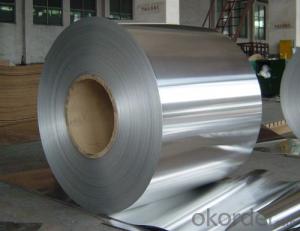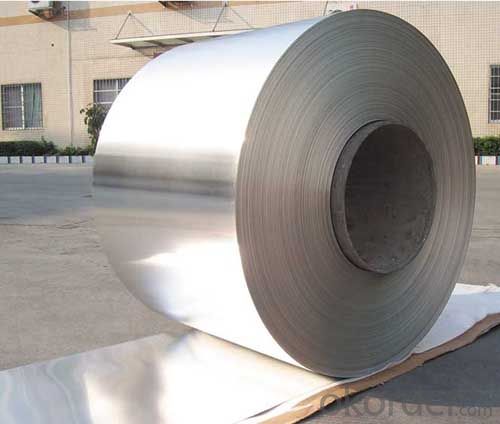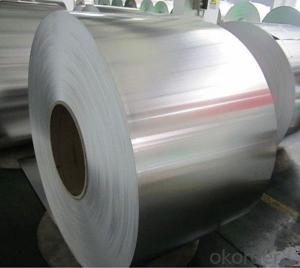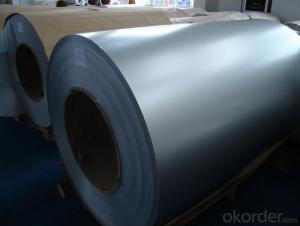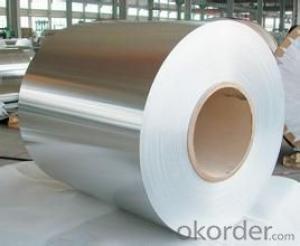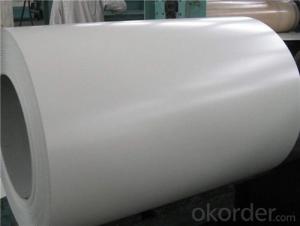Subwoofer Aluminum Coils for Building Construction
- Loading Port:
- China main port
- Payment Terms:
- TT OR LC
- Min Order Qty:
- 5 m.t.
- Supply Capability:
- 10000 m.t./month
OKorder Service Pledge
OKorder Financial Service
You Might Also Like
Specification
1. Specification of Aluminium Coils for Building Construction
Alloy: 1050, 1060, 1100, 1200, 3003, 3004, 3105, 1235, 8011, 8079, 8006, 5005, 5052, 5754, 5083,etc
2) Temper: Free
3) Thickness: ≥3mm
4) Width: 900-2300mm
5) Weight: 7-8 tons per coil
6) Dimensions and weight can be produced according to clients' specifications.
7) Inner Diameter: 505mm, 605mm
8) Packing: Export standard, wooden pallet.
9) Delivery time: 10-20 days
10) Minimum order quantity:20 tons per size.
11) The term of payment: T/T, irrevocable L/C at sight.
12) Surface: Bright
13)Origin: China
2. Feature of Aluminium Coils for Building Construction
*Such coil is specially designed to replace aluminum ingot, due to the high export tax of aluminum ingot, the coil has better price than ingot.
*This type of coil can fit customer's remelting furnace just like ingot, no need to make any change to the production line that was previously used for ingot. The standard coil size and weight is very suitable for the feed gate of furnace.
*This type of coil causes less material wastage than ingot when remelted.
*Our coil is made directly from ore, no need to go though the ingot making process, quality is much better than other suppliers who use ingot scrap to make coil.
Be free from Oil Stain, Dent, Inclusion, Scratches, Stain, Oxide Dicoloration, Breaks, Corrosion, Roll Marks, Dirt Streaks and other defect which will interfere with use
3. Certificate:
SGS and ROHS(if client request, paid by client), MTC(plant provided), Certificate of Origin(FORM A, FORM E, CO), Bureau Veritas and SGS (if client request, paid by client), CIQS certificate
4. Image of Aluminium Coils for Building Construction
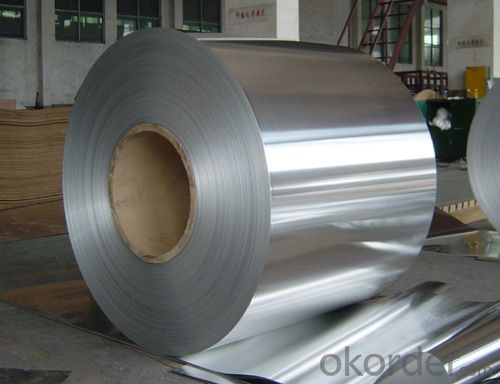
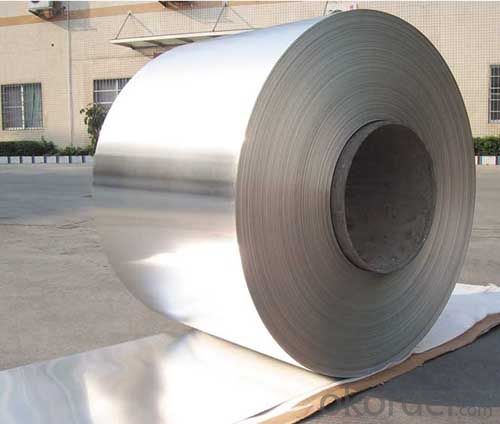
6. Package and shipping of Aluminium Coils for Building Construction
eye to sky
eye to wall
with wooden pallet (wooden case also available)
7. FAQ
1) What is the delivery time?
Dpends on actual order, around 20 days
2) What is the QC system:
We have QC staff of 20 persons and advanced equipment, each production is with MTC traced from Aluminum ingot lot.
3) What market do you mainly sell to?
Australia, America, Asia, Middle East, Western Europe, Africa etc
- Q: Can aluminum coils be used in the production of consumer goods?
- Yes, aluminum coils can be used in the production of consumer goods. Aluminum is a versatile and lightweight material that offers several advantages for consumer goods manufacturing. It is highly corrosion-resistant, making it suitable for products that are exposed to moisture or outdoor elements. Additionally, aluminum coils can be easily formed and shaped, allowing for customization and efficient production processes. Aluminum is commonly used in various consumer goods such as kitchen appliances, automotive parts, packaging materials, and electronic devices. Its properties make it an ideal choice for manufacturers looking to produce durable, high-quality consumer goods.
- Q: This question asks for the method to cut an aluminum coil into smaller sections.
- <p>To cut an aluminum coil into smaller pieces, you can use a metal cutting band saw, which is designed for cutting metal materials. Ensure the blade is sharp and the speed is appropriate for aluminum. Secure the coil in a vice or a cutting table to prevent movement during cutting. Wear safety goggles and gloves. Turn on the saw and slowly feed the coil through the blade, applying steady pressure. After cutting, smooth any rough edges with a file or sandpaper. Always follow safety precautions and manufacturer's instructions for your specific cutting tool.</p>
- Q: Do aluminum coils require any special maintenance?
- Aluminum coils, like any other HVAC system components, do require regular maintenance to ensure optimal performance and longevity. While they may not require any specific special maintenance, they still need attention and care to function efficiently. Regular maintenance tasks for aluminum coils include cleaning, inspection, and occasional coil straightening. Cleaning the aluminum coils is crucial to remove dirt, dust, and debris that can accumulate on the surface over time. This buildup can restrict airflow and hinder heat transfer, reducing the overall efficiency of the system. Cleaning can be done using a soft brush or vacuum cleaner, ensuring that the fins and coils are not damaged in the process. Additionally, regular inspection of the aluminum coils is necessary to identify any signs of corrosion, leaks, or damage. Addressing these issues promptly can prevent further deterioration and costly repairs. It is recommended to check for any bent or damaged fins and straighten them if necessary to maintain proper airflow. Furthermore, it is essential to keep the surrounding area free from debris or vegetation that could obstruct airflow and cause the coils to work harder, leading to increased energy consumption and potential compressor damage. Regularly trimming vegetation and keeping the area clean will help maintain the coils' performance. Lastly, it is advisable to have a professional HVAC technician perform annual maintenance on your HVAC system, including the aluminum coils. They can conduct a more thorough inspection, clean the coils with specialized equipment, check refrigerant levels, and ensure the system is operating at its best. In conclusion, while aluminum coils do not require any specific special maintenance, regular cleaning, inspection, and occasional coil straightening are essential to ensure their optimal performance, prevent damage, and extend their lifespan.
- Q: The user is asking if it's possible to use an electric welder for joining aluminum coils.
- <p>Yes, you can use an electric welder to weld aluminum coils together. However, it's important to use the correct type of welder and settings. Gas tungsten arc welding (GTAW), also known as TIG welding, is commonly used for aluminum due to its precision and ability to control heat input. MIG (Metal Inert Gas) welding can also be used for thicker aluminum materials. Ensure you use the right filler material, a suitable welding current, and proper shielding gas to prevent oxidation. Always follow safety precautions and consult with a professional if you're unsure about the welding process.</p>
- Q: How are aluminum coils processed for further fabrication?
- Aluminum coils are processed for further fabrication through a series of steps to transform them into various products. The first step is typically uncoiling the coil to separate it into individual sheets or strips. This can be done manually or through an automated process. Next, the coils undergo a surface cleaning process to remove any dirt, oil, or other contaminants. This is important to ensure proper adhesion and surface finish in the subsequent fabrication steps. The cleaning process may involve chemical treatments, rinsing, or mechanical brushing. After cleaning, the coils are often subjected to a pre-treatment process, such as chemical conversion coating or anodizing. These treatments improve the surface properties of the aluminum, providing better corrosion resistance, enhanced adhesion for coatings, and improved paint adhesion. Once the pre-treatment is complete, the coils are ready for fabrication. This can involve various techniques such as cutting, bending, stamping, or roll forming. Cutting can be done through shearing, sawing, or laser cutting, depending on the required dimensions and accuracy. Bending and forming are commonly used to shape the aluminum coils into desired profiles or structures. This can be achieved through press brakes, roll forming machines, or specialized bending equipment. Stamping is another popular method of fabrication, where the coils are pressed into specific shapes using dies and punches. This technique is commonly used in the production of automotive parts, household appliances, and electronics. Once the desired fabrication is complete, the coils may undergo additional surface treatments or coatings to provide protection or enhance their appearance. This can include painting, powder coating, or applying protective films. In conclusion, aluminum coils are processed for further fabrication through a series of steps including uncoiling, surface cleaning, pre-treatment, cutting, bending, stamping, and surface treatments. These processes allow for the transformation of the coils into various products with the desired properties and characteristics.
- Q: How are aluminum coils used in the production of food processing equipment?
- Aluminum coils are widely used in the production of food processing equipment due to their desirable characteristics and benefits. These coils are typically made from high-quality aluminum alloy, which offers excellent heat conductivity, corrosion resistance, and durability. One primary application of aluminum coils in the food processing industry is in the construction of heat exchangers. These heat exchangers are essential components of various food processing equipment, such as ovens, fryers, and refrigeration systems. The aluminum coils within the heat exchangers facilitate the transfer of heat between different mediums, ensuring efficient and precise temperature control during food processing. Another important use of aluminum coils is in the manufacturing of evaporator coils. These coils are integral to refrigeration systems used in commercial food processing. The evaporator coils, made from aluminum, aid in the cooling process by absorbing heat from the surrounding environment and allowing refrigerants to evaporate, thereby maintaining low temperatures within the equipment. Additionally, aluminum coils find application in the construction of food storage and transportation equipment, such as refrigerated trucks and containers. Aluminum's lightweight nature contributes to fuel efficiency and enables easier transportation of food products while maintaining their quality and freshness. Furthermore, aluminum coils are valued for their hygienic properties and ease of cleaning, making them ideal for food processing equipment. Aluminum surfaces can be easily sanitized, ensuring a high level of cleanliness and preventing contamination during food production. Overall, aluminum coils play a crucial role in the production of food processing equipment by providing excellent heat transfer, corrosion resistance, durability, and hygienic qualities. Their usage helps ensure efficient food processing operations, optimal temperature control, and the maintenance of food quality and safety standards.
- Q: Is it possible to utilize a grinder to smooth out or remove a damaged area on a steel coil?
- <p>Yes, you can use a grinder to grind down a damaged section of a steel coil. However, it's crucial to use the appropriate type of grinder designed for metalworking and to ensure safety precautions are taken, such as wearing protective gear. The grinder should be capable of handling the hardness of the steel and should be operated by someone experienced with such equipment. Always follow the manufacturer's guidelines and safety standards to prevent accidents and ensure the effectiveness of the grinding process.</p>
- Q: Is it possible to utilize aluminum coils in the packaging of food products?
- <p>Yes, aluminum coils can be used for food packaging. They are commonly used in the production of aluminum foil, which is a popular material for food packaging due to its properties such as light weight, barrier to light and oxygen, and recyclability. Aluminum foil is used to wrap food, line baking sheets, and create containers, providing a protective barrier that helps to preserve freshness and extend shelf life. However, it's important to ensure that the aluminum used meets food-grade standards to avoid any health risks.</p>
- Q: Are aluminum coils suitable for decorative purposes?
- Yes, aluminum coils are suitable for decorative purposes. Aluminum is a versatile material that can be easily molded into various shapes and sizes, making it suitable for decorative applications. Its lightweight nature, durability, and resistance to corrosion make it an ideal choice for both indoor and outdoor decorative projects. Additionally, aluminum can be finished with different coatings and finishes, such as powder coating or anodizing, to enhance its aesthetic appeal. These coatings can provide a wide range of colors, textures, and patterns, allowing for endless design possibilities. Furthermore, aluminum coils can be easily formed into intricate designs, making them suitable for decorative elements like trims, accents, panels, or even sculptures. Overall, aluminum coils offer a cost-effective, durable, and aesthetically pleasing option for various decorative purposes.
- Q: Can aluminum coils be custom-made to specific requirements?
- Yes, aluminum coils can be custom-made to specific requirements. Aluminum coils are versatile and can be tailored to meet a wide range of specifications and applications. Manufacturers can customize the dimensions, thickness, width, and length of the coil to accommodate specific requirements. Additionally, various surface finishes, such as embossed patterns or coatings, can be applied to enhance the appearance or improve functionality. Customization of aluminum coils allows for precise matching of specific needs in industries such as construction, transportation, aerospace, and many others.
Send your message to us
Subwoofer Aluminum Coils for Building Construction
- Loading Port:
- China main port
- Payment Terms:
- TT OR LC
- Min Order Qty:
- 5 m.t.
- Supply Capability:
- 10000 m.t./month
OKorder Service Pledge
OKorder Financial Service
Similar products
Hot products
Hot Searches
Related keywords
